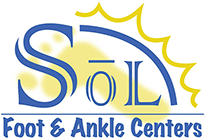How to Keep Your Feet Healthy and Happy
Checking your feet is key
Do inspect your feet. You should look at your feet often, if not every day. This is a MUST if you have diabetes! Diabetics are at risk of foot problems and infections due to decreased circulation. Look for any cuts or scrapes that are slow to heal.
Other changes in the feet to look for are: skin color, texture, temperature, redness or swelling. These changes may be a sign of more serious heath problems. Have your feet checked by your podiatrist and talk to him about how to keep your feet healthy.
Yes, you should wash your feet.
Do wash your feet every day. We wash our hair, our backs, our knees, but often times we forget to wash our feet. Clean feet are just as important as any other parts of the body. In our shoes, we sweat and bacteria and dirt can build up, eventually leading to foot problems. When we go barefoot, it is especially important to wash our feet because who knows what kinds of things we’re stepping on. It’s better to take preventative measures than to wait for problems to occur.
Safely cut your nails
Trimming your nails may seem like a simple task but there are some rules to follow. Do not cut your nails rounded, but rather straight. Do not cut your nails too short because your nail can lift from the toe bed making it vulnerable to fungal infections. Do not forget to clean your clipper, it’s a good clean practice that may save you from catching anything someone that used the clipper had.
Comfortable shoes only
Do make sure your shoes fit. We may have been a size 6 last year, but our feet grow and expand. Tight shoes can cause calluses, blisters, and bunions. It can make your feet permanently ugly, so make sure you don’t disfigure your feet. Our feet are slightly larger in the afternoon, therefore, to get the best fitting shoes, shoe shop in the afternoon.
One size does NOT fit all
Do wear shoes that are designed for certain activities. Make sure you wear the right kinds of shoes for the right activities you’re doing. Use a sport specific shoes that are designed for specific activities, like running, football, soccer and basketball. The wrong shoes can put you at risk of developing foot problems or worse, injury. Replace your athletic shoes regulalry; running shoes should be replaced every 300-500 miles. Talk to your podiatrist about what sport specific shoe is right for you.
Avoid going barefoot
Do try to minimize going barefoot. Shoes prevent us from stepping on sharp objects, as well as protect our feet from picking up viruses, warts, fungus, and other common foot ailments.
Do not self-treat
Do not try to self-treat. Unless directed by a doctor or professional, it is better to not try to treat your own conditions. By doing so, you may be causing more damage or even wasting money on things that do not actually work. For best results and safe treatment, you should consult a physician or podiatrist.
Is my foot pain normal?
Do not ignore pain in your feet. Our feet get tired when we’re on standing all day, but if you experience persistent pain, your feet may be trying to tell you something. Pain in your feet is never normal, so do not ignore it. Schedule an appointment today!

